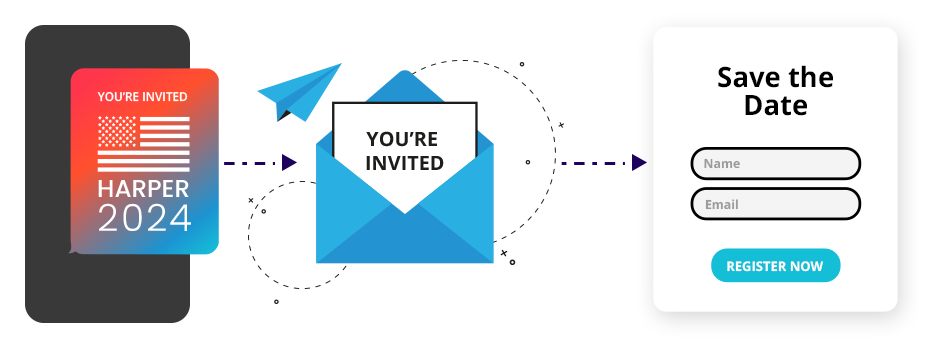8 Digital Political Campaign Tools & How to Use Them Synergistically
Reach voters effectively & efficiently with these must-have political campaign tools.

Whether you’re gearing up for a local election or setting out to win a national one, you need the right people and tools to help make your political journey successful.
With these political campaign tools, you’ll win the hearts and minds of your constituents, rally volunteers, and make insightful decisions based on real voter data. Plus, we offer tips on ensuring all your tools work together to create a cohesive experience for your audience and your team.
What Are the Must-Have Digital Tools for Any Political Campaign?
The must-have digital tools for any political campaign include:
- Campaign management software
- A website builder
- SMS and email marketing
- Campaign advertising
- Fundraising tools
- Event management
- Voter file software
Let’s dive into each one.
Campaign Management Software
First up is campaign management software. Think of this software as your all-in-one tool that manages everything (or almost everything) that goes into your campaign, from fundraising to managing volunteers and engaging with voters. Many of these software tools also include political CRM (campaign relationship management) systems to track contacts and voters.
Some popular campaign management software tools include:
- NationBuilder
- NGP VAN
- Aristotle
- Trailblazer
Some organizations find this all-in-one software helpful, while others cherry-pick which separate tools they need depending on their budget and preferences.
Effortless Political Texting Starts Here
Every contact counts! Gather, segment, and reach them all year.
Website Builder
If you’re running a political campaign, you need a website. When voters Google your name, you want them to be able to find you immediately, learn more about your ideas and values, and mobilize. Websites essentially serve as marketing tools for political campaigns.
You want to ensure that you choose a website builder that can integrate a donation page, include email/text contact list sign-up forms, and have mobile-friendly designs. Many political organizations and candidates choose Wix or WordPress, but check out our complete list of website builders to see which one might be the best fit.
SMS Marketing
You might notice that phone banking isn’t on this list, and that’s because, while it can be effective, many voters would rather receive communications via text. SMS marketing is one of the best ways to reach and engage with people quickly. What political campaigns can learn from text marketing is that text messages can provide a clear CTA, directing constituents to take action, whether donating or volunteering.
But you might wonder, “Can digital tools help me get out the vote (GOTV) more effectively?” Absolutely! Digital tools can help you GOTV through SMS and email blasts (more on email marketing next) for targeted voter reminders.
EZ Texting is the political campaign tool every candidate should keep in their front pocket. When you need a GOTV tool, canvassing messaging, volunteer communication, or more, use EZ Texting for bulk texting, one-on-one messaging, and easy contact management.
Email Marketing
The other political campaign marketing strategies and tools that you need to use are email marketing tools. Two key differences between SMS and email marketing are that email marketing is best for less urgent messaging and longer-form content, while SMS marketing reaches voters quickly, and its messages should be short and to the point.
So, it’s important to utilize email messaging with your audience to let them know what your campaign has been doing, upcoming events, donations needed, and other campaign details.
Check out MailChimp, ActiveCampaign, or EmailOctopus for marketing tools for political campaigns.
Campaign Advertising
Campaign advertising is another political campaign tool to keep in your tool belt; this can range anywhere from expensive TV ads to more budget-friendly paid websites or social platform ads. Campaign advertising allows you to reach your audience with targeted content across multiple channels.

Fundraising Tools
Fundraising is the bread and butter of your political campaign, so it’s crucial to have the right software that makes donations seamless. You might wonder, “How can digital tools help me raise more money for my campaign?” Digital tools help you raise more money for your campaign by offering secure online donations, donor management features, and even crowdfunding capabilities.
Some all-in-one campaign software tools include campaign contribution management, but there are many stand-alone fundraising tools, including iDonatePro, Donorbox, ActBlue, WinRed, and Numero.
Event Management
Most campaigns organize town halls, fundraising galas, conventions, debates, and other types of events to engage with their donor base and constituents and reach more people. So, you need event management tools to help you set up your event, manage ticketing, and keep up with RSVPs.
While there aren’t many free political campaign tools, you can usually find free event management tools like Eventbrite and Whova. Cvent is another popular tool for managing campaign events.
Voter File Software
Every political campaign runs on voter data, so you’re probably wondering, “How can I use digital tools to target specific voter demographics?” You can use digital tools to target specific voter demographics, informing ads, canvassing, GOTV efforts, and more.
Look for voter outreach tools like voter file software, which are digital databases of voter information, to tailor your messaging and outreach efforts and conduct voter scoring. This vast data includes audience voting history, election turnout, voter registration, and other helpful information.
Outside of state and local voter data files, many commercial vendors offer voter file software with data from additional sources, some of which include NGP VAN, L2 Data, Data Trust, and Democratic Data Exchange.
How To: Cohesive Campaign Management
Just because all-in-one political campaign tools are available doesn’t mean you must use them. Depending on the needs and budget of your campaign, you might opt for separate tools. But this raises the question, “How do I integrate different digital tools for a cohesive campaign?”
To integrate different digital tools for a cohesive campaign, look for platforms with API integrations that allow data to flow seamlessly between tools, streamlining your workflow and maintaining consistency across all campaign touchpoints. For example, you could integrate your text marketing platform with your email marketing platform and political CRM system.

Here are some other ways to integrate separate tools for a cohesive campaign:
- Integrate your fundraising platform with your website and social media profiles for seamless giving experiences, and incorporate text-to-donate with your text marketing campaign.
- Send event evites through text and email and include registration links on your social media channels and website.
- Ensure your campaign design is used across all touchpoints, from your website to social media platforms and event pages.
How To: Stay Compliant
With all of these tools at your fingertips, one of the biggest — and most important — questions should be, “How can I ensure my digital campaign is ethical and compliant?”
You can ensure your digital campaign is ethical and compliant by clearly disclosing campaign sponsorships, tracking all donations and campaign spending, following data privacy regulations, abiding by voter microtargeting rules, and not spreading misleading information or using voter manipulation tactics.
While using political campaign marketing strategies and tools, remember that responsible data use, trust, and transparency are paramount.
Keep Up with Future Trends in Political Campaign Tools
What are some emerging digital trends in political campaigning? Some emerging digital trends in political campaigning include AI for more robust voter insights, improved voter scoring, and more personalized experiences with your campaign. Plus, you might start seeing virtual- or augmented-reality technology used for immersive campaign experiences, like virtual rallies or political debates.
No matter what political campaign tools you use, make sure to do your research to find which ones have the features you need. The right tools can make all the difference.
Effortless Political Texting Starts Here
Every contact counts! Gather, segment, and reach them all year.
FAQs
Yes, there are free digital tools available for political campaigns. Free tools for political campaigns usually take the form of software with limited plans and event management tools. Most digital campaign tools also offer free trials to test before investing.
You can measure the success of your digital campaign efforts by tracking website traffic, social media engagement, polling data, email open rates, event registration and attendance, fundraising progress, and, ultimately, voter turnout.
Yes, there is a risk of digital fatigue among voters due to the saturation of political campaign messages during an election year. To avoid digital fatigue among voters, keep your messages concise, relevant, and engaging — and keep an eye on the frequency of your messages. Keep your voter outreach fresh by using videos, infographics, polls, social posts, and more to keep your audience engaged. And remember, personalization is key! Avoid generic messages, tailor your communication to voters’ individual concerns.
See other resources related to:

